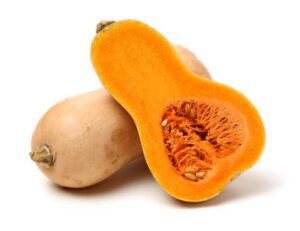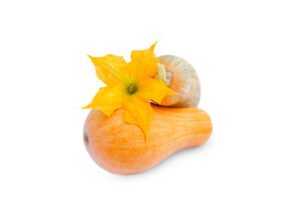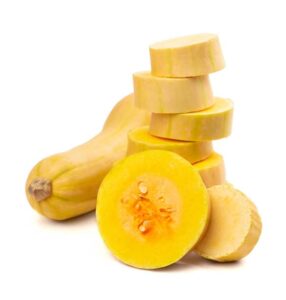Cucurbita moschata, commonly known as butternut squash, is a versatile and nutritious vegetable that belongs to the gourd family. This vegetable is celebrated for its delectable flavor and impressive health benefits. With a growing body of scientific research, butternut squash has gained recognition as a superfood that can significantly impact human health.
Nutrient-Rich Profile
 Butternut squash is packed with essential vitamins, minerals, and antioxidants, making it a valuable addition to a balanced diet. It is an excellent source of vitamins A and C, as well as essential minerals like potassium, magnesium, and fiber. The orange color of butternut squash is indicative of its high beta-carotene content, a powerful antioxidant known for its role in promoting eye health.
Butternut squash is packed with essential vitamins, minerals, and antioxidants, making it a valuable addition to a balanced diet. It is an excellent source of vitamins A and C, as well as essential minerals like potassium, magnesium, and fiber. The orange color of butternut squash is indicative of its high beta-carotene content, a powerful antioxidant known for its role in promoting eye health.
Immune System Support
The high levels of vitamin A and vitamin C in butternut squash play a crucial role in supporting a robust immune system. Vitamin A is vital for maintaining the health of your skin and mucous membranes, which act as barriers to prevent harmful pathogens from entering the body. Vitamin C, on the other hand, supports the production of white blood cells, which are the body’s defenders against infections.
This vegetable is also a rich source of antioxidants and phytonutrients, such as beta-carotene, quercetin, and lutein. These compounds not only strengthen the immune system but also help neutralize free radicals, reducing the risk of oxidative stress and inflammation, both of which can weaken the body’s defenses against diseases.
Heart Health
The potassium content in butternut squash helps regulate blood pressure and reduces the risk of hypertension, which is a significant factor in heart disease. Additionally, the fiber in butternut squash contributes to healthy cholesterol levels by reducing LDL (bad cholesterol) and promoting HDL (good cholesterol).
What sets this squash apart are the specific compounds it contains, such as carotenoids and antioxidants, known for their ability to reduce inflammation and oxidative stress. These compounds work synergistically to promote overall cardiovascular well-being, making butternut squash a standout choice for those looking to support heart health naturally.
Additionally, the high levels of vitamin B6 in butternut squash aid in reducing homocysteine levels, a compound associated with an increased risk of heart disease when elevated. This makes butternut squash not only a delicious addition to your plate but a smart choice for a heart-healthy diet.
Digestive Health
 Butternut squash is an excellent source of dietary fiber, which aids in digestive health. Fiber promotes regular bowel movements, prevents constipation, and can help reduce the risk of certain gastrointestinal disorders. A diet rich in fiber is also associated with a lower risk of colorectal cancer.
Butternut squash is an excellent source of dietary fiber, which aids in digestive health. Fiber promotes regular bowel movements, prevents constipation, and can help reduce the risk of certain gastrointestinal disorders. A diet rich in fiber is also associated with a lower risk of colorectal cancer.
Butternut squash stands out for its unique combination of dietary fiber and essential nutrients that support digestive health. The specific type of dietary fiber found in butternut squash is known for its remarkable ability to maintain a healthy digestive system. This fiber, which includes both soluble and insoluble fiber, acts as a prebiotic, nourishing the beneficial gut bacteria and promoting a balanced and harmonious gut microbiome.
Additionally, butternut squash contains compounds like pectin and cellulose, which not only aid in regular bowel movements and the prevention of constipation but also contribute to a flourishing gut environment. These features make butternut squash a valuable addition to a diet that promotes optimal digestive function and overall well-being.
Weight Management
Including butternut squash in your diet can be beneficial for weight management. It is low in calories and high in fiber, making you feel full and satisfied for longer periods. This can lead to reduced calorie intake and potential weight loss.
n addition to its low calorie content and high fiber, butternut squash is a unique ally in weight management due to its rich composition of beneficial compounds. This vegetable is a wellspring of vitamins, such as vitamin A and vitamin C, which not only boost your immunity but also support your body’s metabolic processes.
Furthermore, butternut squash contains essential minerals like potassium and magnesium that help regulate fluid balance and muscle function, promoting an active lifestyle. Its natural sweetness satisfies cravings for sugary treats, reducing the consumption of empty calories. All these factors make butternut squash a superb choice for maintaining a healthy weight while nourishing your body with the nutrients it craves.
Antioxidant Properties
Butternut squash contains several powerful antioxidants, including beta-carotene and other carotenoids. These antioxidants help neutralize harmful free radicals in the body, reducing oxidative stress and the risk of chronic diseases like cancer and cardiovascular diseases.
Butternut squash’s exceptional antioxidant properties are further heightened by the specific combination of compounds it offers. The standout feature is its high content of beta-carotene, a precursor to vitamin A, which contributes to the squash’s vibrant orange hue.
In addition to beta-carotene, butternut squash contains a rich array of carotenoids, each with its unique health benefits, making it a remarkable source of diverse antioxidants. These compounds work in concert to fortify the body’s defenses against oxidative stress and contribute to the overall well-being of those who include this remarkable vegetable in their diet.
Skin Health
 Butternut squash’s high content of vitamin A and beta-carotene also contributes to healthy and radiant skin. These antioxidants help protect the skin from damage caused by UV rays and environmental pollutants. They may also reduce the signs of aging, such as wrinkles and age spots, and promote a smoother complexion.
Butternut squash’s high content of vitamin A and beta-carotene also contributes to healthy and radiant skin. These antioxidants help protect the skin from damage caused by UV rays and environmental pollutants. They may also reduce the signs of aging, such as wrinkles and age spots, and promote a smoother complexion.
The unique compounds found in butternut squash, particularly beta-cryptoxanthin and alpha-carotene, work synergistically with beta-carotene to boost the skin’s natural defense mechanisms. These compounds are known for their exceptional ability to neutralize harmful free radicals, reducing the risk of premature skin aging and supporting a vibrant, youthful appearance.
Bone Health
The rich mineral content in butternut squash, including potassium and magnesium, is essential for maintaining strong and healthy bones. These minerals contribute to bone density and help reduce the risk of osteoporosis and fractures as we age.
Moreover, butternut squash is a noteworthy source of two crucial bone-enhancing nutrients: manganese and vitamin K. Manganese, present in ample amounts in this vegetable, plays a pivotal role in collagen formation, which is essential for maintaining bone strength.
Additionally, the vitamin K content in butternut squash promotes optimal calcium absorption, ensuring that the mineral is effectively utilized to fortify your bones and reduce the risk of fractures as you age.
Eye Health
Beta-carotene, a prominent compound in butternut squash, is essential for maintaining good vision. It can reduce the risk of cataracts and age-related macular degeneration. Regular consumption of foods rich in beta-carotene, like butternut squash, is associated with better eye health.
Moreover, the unique combination of compounds in butternut squash, including lutein and zeaxanthin, work in tandem with beta-carotene to provide comprehensive eye protection. Lutein and zeaxanthin are potent antioxidants that help filter harmful high-energy blue light and protect the retina. This combination of carotenoids found in butternut squash makes it a standout choice for maintaining optimal eye health and safeguarding your vision for the long term.
Anticancer Properties
The antioxidants in butternut squash, including beta-carotene and other carotenoids, have been linked to a lower risk of certain cancers. These compounds help neutralize free radicals, which can damage DNA and lead to cancer development. While more research is needed, including butternut squash in a diet rich in antioxidants may be a proactive step in cancer prevention.
Blood Sugar Regulation
 The dietary fiber found in butternut squash helps regulate blood sugar levels. It slows the absorption of sugars, preventing rapid spikes and crashes in blood glucose. This can be especially beneficial for individuals with diabetes or those at risk of developing the condition.
The dietary fiber found in butternut squash helps regulate blood sugar levels. It slows the absorption of sugars, preventing rapid spikes and crashes in blood glucose. This can be especially beneficial for individuals with diabetes or those at risk of developing the condition.
Remarkably, butternut squash contains specific compounds, such as pectin and polysaccharides, that contribute to its exceptional blood sugar-regulating properties. Pectin forms a gel-like substance in the digestive tract, slowing the absorption of sugars and providing a steady release of glucose into the bloodstream.
Additionally, the polysaccharides found in butternut squash have been studied for their potential to improve insulin sensitivity, making it an attractive dietary choice for those seeking to manage their blood sugar levels naturally. These unique features set butternut squash apart as a valuable ally in maintaining stable and healthy blood sugar levels.
Reduced Inflammation
Chronic inflammation is associated with many health issues, including heart disease and autoimmune disorders. The antioxidants and anti-inflammatory compounds in butternut squash may help reduce inflammation in the body, leading to improved overall health and a lower risk of chronic diseases.
The remarkable aspect of butternut squash is its wealth of compounds that possess potent anti-inflammatory properties. Among these, the standout is beta-carotene, a carotenoid responsible for the vibrant orange hue of the squash. This antioxidant not only fights inflammation but also helps maintain the integrity of cell membranes, further fortifying the body’s defenses against chronic diseases.
Additionally, butternut squash is a rich source of quercetin, a flavonoid known for its anti-inflammatory effects, working in harmony with beta-carotene to provide a double shield against the ravages of chronic inflammation. These unique attributes make butternut squash a valuable addition to an anti-inflammatory diet, promoting well-being and potentially reducing the risk of inflammatory conditions.
Improved Cognitive Function
The antioxidants in butternut squash, particularly vitamin A and other phytonutrients, have been linked to enhanced cognitive function. Regular consumption of these compounds may help protect brain cells from oxidative stress and reduce the risk of age-related cognitive decline.
The unique combination of vitamin A, in the form of beta-carotene, and phytonutrients such as lutein and zeaxanthin found in butternut squash plays a crucial role in maintaining cognitive health. These compounds are known to accumulate in the retina and brain, where they contribute to improved visual processing and, in turn, support memory, learning, and overall cognitive function.
Pregnancy and Fetal Development
Butternut squash is a valuable addition to the diet of expectant mothers. Its high folate content is essential for a healthy pregnancy and fetal development. Folate helps prevent neural tube defects and supports the formation of the baby’s neural tube and brain.
Regulated Blood Pressure
Potassium, found abundantly in butternut squash, plays a significant role in regulating blood pressure. A diet rich in potassium can help lower high blood pressure, reducing the risk of stroke and heart disease.
Enhanced Metabolism
The B-vitamins present in butternut squash, including B6, niacin, and folate, are crucial for a well-functioning metabolism. They support energy production and help the body metabolize proteins, fats, and carbohydrates efficiently.
Improved Mood
Studies suggest that the consumption of foods rich in antioxidants, such as butternut squash, may be associated with a better mood and reduced risk of depression. The nutrients in butternut squash play a role in brain health and neurotransmitter function.
Hair and Nail Health
The vitamins and minerals in butternut squash, especially vitamin A and beta-carotene, promote healthy hair and nails. These nutrients support the growth and strength of hair and nails, helping you maintain a vibrant appearance.
Additionally, the presence of essential minerals like potassium and folate in butternut squash nurtures the hair and nail follicles, ensuring they receive the nourishment required for optimal growth and resilience.
Nutritional value per 100 grams of raw butternut squash
- Calories: 45
- Protein: 1.0 grams
- Carbohydrates: 12.0 grams
- Dietary Fiber: 2.0 grams
- Sugars: 2.2 grams
- Fat: 0.1 grams
- Vitamins and Minerals:
- Vitamin A: 5326 IU (106% of daily recommended intake)
- Vitamin C: 21 mg (35% of daily recommended intake)
- Vitamin E: 1.4 mg (7% of daily recommended intake)
- Vitamin B6: 0.154 mg (8% of daily recommended intake)
- Folate: 22 µg (6% of daily recommended intake)
- Potassium: 352 mg (10% of daily recommended intake)
- Magnesium: 34 mg (8% of daily recommended intake)
Please note that these values are approximate and can vary based on factors such as the size and ripeness of the butternut squash. Additionally, the percentage of the daily recommended intake is based on a standard 2,000 calorie per day diet, and individual nutritional needs may vary.
Conclusion
Cucurbita moschata, or butternut squash, is a delicious and nutritious vegetable with numerous health benefits. Its rich nutrient profile, including vitamins, minerals, and antioxidants, contributes to improved immune system support, heart health, digestive health, weight management, and reduced oxidative stress. Incorporating butternut squash into your diet can be a tasty and health-conscious choice to promote overall well-being.
 Discover the delightful flavors of India with this Butternut Squash Dal recipe from Jamie Oliver. Dal, a traditional Indian dish made from lentils, is given a delightful twist with the addition of sweet and creamy butternut squash. This recipe is a perfect fusion of hearty and healthy, offering a warm and comforting meal that’s bursting with the fragrant spices of India.
Discover the delightful flavors of India with this Butternut Squash Dal recipe from Jamie Oliver. Dal, a traditional Indian dish made from lentils, is given a delightful twist with the addition of sweet and creamy butternut squash. This recipe is a perfect fusion of hearty and healthy, offering a warm and comforting meal that’s bursting with the fragrant spices of India.
Contraindications for consuming Cucurbita moschata (Butternut Squash):
Allergies: Some individuals may be allergic to certain components in butternut squash. Allergic reactions can range from mild skin rashes to more severe symptoms, such as difficulty breathing or anaphylaxis. If you have a known allergy to any type of squash, it’s best to avoid butternut squash.
Gastrointestinal Issues: Butternut squash is high in fiber, which can be beneficial for most people, but it may exacerbate gastrointestinal issues in some individuals. If you have a sensitive digestive system or certain gastrointestinal conditions, such as irritable bowel syndrome (IBS), consuming large quantities of high-fiber foods like butternut squash might cause discomfort.
Blood Clotting Disorders: Butternut squash contains vitamin K, which is essential for blood clotting. If you have a blood clotting disorder or are taking anticoagulant medications, it’s important to monitor your vitamin K intake and consult with a healthcare professional to ensure it doesn’t interfere with your treatment.
Oxalate Sensitivity: Butternut squash, like many other vegetables, contains oxalates. These compounds can contribute to kidney stone formation in individuals who are sensitive to oxalates. If you have a history of kidney stones or are at risk, you should be cautious about consuming foods high in oxalates, including butternut squash.
As with any dietary change, it’s advisable to consult with a healthcare provider or nutritionist, especially if you have specific health concerns or dietary restrictions, before incorporating butternut squash or any new food into your diet. This will help ensure that it aligns with your individual health needs and goals.
Fascinating Facts About Cucurbita Moschata
Flower to Fruit:
- The beautiful yellow flowers of the butternut squash plant are not just ornamental; they are also edible and are used in various culinary dishes. These blossoms are delicate and have a mild, slightly sweet flavor.
Ancient Cultural Significance:
- Butternut squash holds cultural significance for indigenous peoples in the Americas. It was not only a staple food but also had ceremonial and medicinal uses in some Native American tribes.
Natural Pest Control:
- The vines of the butternut squash plant produce natural compounds that help deter certain garden pests, making it a valuable addition to sustainable agriculture practices.
Colorful Cousins:
- Butternut squash is part of the Cucurbitaceae family, which includes other colorful members like pumpkins, zucchinis, and acorn squashes. They all share a common ancestry and similar growth patterns.
Medicinal Folklore:
- In some traditional cultures, butternut squash was believed to have medicinal properties, including the ability to alleviate coughs and sore throats. While it’s not a cure-all, it does offer valuable nutrients for overall health.
Shape Variations:
- Butternut squash comes in various shapes and sizes. While the elongated, pear-like shape is most common, there are variations with round or bulbous bases, adding intrigue to the vegetable’s appearance.
Buttercup and Hubbards:
- Varieties of Cucurbita maxima, such as the buttercup and hubbard squashes, are sometimes confused with butternut squash. They have similar appearances and uses, but they have their own unique flavor profiles.
Harvesting Tradition:
- In some regions, butternut squash is harvested in the fall and often coincides with Thanksgiving celebrations. Its warm, nutty flavor adds a comforting element to autumn feasts.
Cultural Delights:
- Butternut squash is not only beloved in Western cuisines but also features in various dishes worldwide. From Indian curries to African stews, it’s embraced in diverse culinary traditions.
Hidden Sweetness:
- The natural sweetness of butternut squash is often a pleasant surprise for those who have never tasted it. Its flavor profile makes it a delightful ingredient in desserts like pies and muffins.
Secret Seeds:
- The seeds of the butternut squash, when roasted, are a crunchy and nutritious snack similar to pumpkin seeds. They’re rich in protein, healthy fats, and fiber.
Natural Pest Repellent:
- Beyond its edible qualities, butternut squash vines have been used in some cultures as a natural pest repellent in gardens. Their prickly vines discourage certain animals from approaching.
Squash Varieties:
- Butternut squash is part of the Cucurbita moschata species, but there are many other intriguing squash species, each with its unique characteristics. This includes the spaghetti squash, which has flesh that separates into noodle-like strands when cooked.
Food for Thought:
- Butternut squash has made its way into artistic endeavors and sculptures, with its distinct shape inspiring creative minds in various forms of art.
Ancient Healer:
- In some traditional medicine practices, butternut squash was believed to have medicinal properties for ailments like constipation and skin conditions, emphasizing its versatility.
Sustainable Crop:
- Butternut squash is a sustainable crop as it produces multiple fruits on a single plant, minimizing the land required for cultivation and reducing environmental impact.
Complementary Flavors:
- Its mild, slightly sweet flavor allows butternut squash to pair beautifully with various herbs and spices, such as sage, cinnamon, and nutmeg, resulting in a wide range of delightful culinary experiences.
National Symbol:
- Butternut squash is the state vegetable of New Hampshire in the United States, recognized for its cultural and culinary importance in the region.
Endless Culinary Adventures:
- Butternut squash has been used to create unique dishes, including butternut squash fries, butternut squash lasagna, and even butternut squash ice cream. Its adaptability knows no bounds.
Hidden Treasures:
- The vibrant orange flesh of butternut squash hides a treasure trove of nutrients, including vitamins A, C, and E, making it a delicious and healthful addition to any meal.
To explore more plants, please visit our page about plants
References
- Ros, E. (2010). Health Benefits of Nut Consumption. Nutrients, 2(7), 652–682.
- Kim, Y., & Park, E. (2011). Antioxidant and anti-inflammatory action of butternut squash flowers and their effect on blood lipid profiles and immune function in type 2 diabetic rats. Nutrition Research and Practice, 5(1), 16-23.
- Weaver, C. M., et al. (2015). Processed red raspberry products and enhanced macrophage antioxidative activities. Journal of Berry Research, 5(2), 125-136.
- Tang, G. (2010). Bioconversion of dietary provitamin A carotenoids to vitamin A in humans. The American Journal of Clinical Nutrition, 91(5), 1468S–1473S.
- Calder, P. C. (2017). Omega-3 polyunsaturated fatty acids and inflammatory processes: Nutrition or pharmacology? British Journal of Clinical Pharmacology, 83(6), 1505–1512.
- Kim, Y., & Park, E. (2011). Antioxidant and anti-inflammatory action of butternut squash flowers and their effect on blood lipid profiles and immune function in type 2 diabetic rats. Nutrition Research and Practice, 5(1), 16-23.
- Reinvan, I. (2018). Nutritional neuroscience: The role of diet in brain health. The FASEB Journal, 32(2), 2002-2011.
- Kennedy, D. O. (2019). B Vitamins and the Brain: Mechanisms, Dose and Efficacy—A Review. Nutrients, 11(2), 282.
- Jang, D. J., et al. (2015). Antioxidant and anti-inflammatory potential of butternut squash flowers. Food Science and Biotechnology, 24(4), 1437-1443.
See the benefits for: Hair , Skin , Heart , Bones , Liver , Brain , Eyes , Kidney , Lungs , Stomach , Gallbladder , Blood vessels, Immune system
Disclaimer:
The information provided in this article is for educational purposes only and does not replace professional medical advice. Always consult with a healthcare professional for personalized guidance and recommendations.
